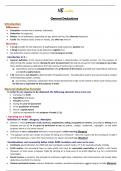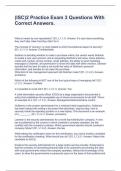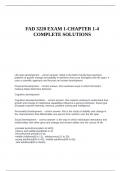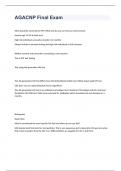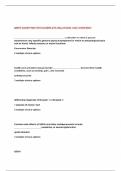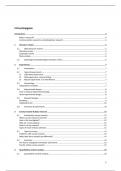NB notes
General Deductions
Introduction
Differences
• Exemption- income that is exempt; subtracted
• Deduction- for expenses
• Rebate- for all individuals, depending on age, below tax line, thus after-tax deduction
• Credit- like medical credit, similar to rebate, also after-tax amount
Overview
• S 11 (a) provides for the deduction of qualifying pre-trade expenses- positive test
• S 23 (g) stipulates what may not be deducted- negative test
• No deductions may be claimed, if a person is not carrying on a trade
Introduction to S 11
• General definition: S 11. General deductions allowed in determination of taxable income- For the purpose of
determining the taxable income (during the year of assessment) derived by any person from carrying on any trade,
there shall be allowed as deductions from the income of such person so derived—
a) expenditure and losses actually incurred in the production of the income, provided such expenditure and losses
are not of a capital nature;
• S 23. Deductions not allowed in determination of taxable income. - No deductions shall in any case be made in respect
of the following matters, namely:
g) any moneys, claimed as a deduction from income derived from trade, to the extent to which such moneys were
not laid out or expended for the purposes of trade;
General deduction formula
In order for an expense to be deducted, the following elements have to be met:
1. Carrying on a trade
2. Expenditure and losses
3. Actually incurred
4. During the year of assessment
5. In the production of income
6. Not of a capital nature
7. Laid out or expended for the purposes of trade (s23g)
1. Carrying on a Trade
Definition of ‘trade’: (Burgess), (Nemojim)
• Section 1: “every profession, trade, business, employment, calling, occupation or venture, including the letting of any
property and use of, or the grant of permission to use any patent… design… trademark… copyright… or any other
property which is of a similar nature”
• Definition is not an exhaustive definition, must be given a wider meaning (Burgess)
• “If a taxpayer carries out a trade, his motive for doing so is irrelevant”- does not cease to be the carrying of a trade if
one of the purposes, or even the main purpose is to enjoy a tax advantage (Burgess)
Considerations (not necessarily define trade, SARS considers each case on its own)
• Continuity- good indication, but SARS will also investigate suspect trades, if it is for example actually a hobby
• Profit motive- not necessarily have to make profit, but must be reasonable expectation of profits in the future
(however, in some cases a taxpayer might be carrying on a trade even of no profit objective, e.g. for a commercial
advantage)
• Rental income- in practice, the principle of continuity might deny a deduction, but Commissioner will usually allow
deductions, but limit it to income
• Passive investment income- interest, dividends, royalties, annuities and pensions- not carrying on a trade (Burgess)
, NB notes
- But SARS practice note 31: for e.g. when a loan is taken out to invest and gain interest- may deduct expenses, but
cannot result in a loss. E.g. interest income =R 100 000; interest expense = R80 000. Thus included income is
76 200 (100 000-23 800). But because of practice note, there will be no inclusion in income
- Strictly according to the law, there is no basis for this, but the practice has developed over the years and is
followed by Inland Revenue
• More than one trade- taxable income calculated for each trade separately, and then add together taxable income
amounts
Pre-trade expenditure (s11A)
• In the process of commencing and setting up the carrying on of a trade, the taxpayer incurs expenditures
• Expenditures must not be of a capital nature
• Can claim expenses as soon as trading commences, but may not create a loss or be set off against another trade, but
can be carried forward to another year
• Only expenditures under S 11 (a)-(w) not (x); 11D (research and development) or 24 J (Interest incurred) may be
deducted
2. Expenditure and losses (Labat), (Joffe & Co)
• Meaning of “losses” is somewhat obscure, not much difference from expenditure”, thus both can be claimed: But
expenditures are voluntary, and losses are involuntary (Joffe)
• Labat: Had to buy entire company to gain access to something in a company, paid by issuing shares of their company
(not giving up an asset), but wanted to deduct that amount under S11 A, and was declined- must be an expense or a
loss
• “Obligation” or “Liability” are not synonyms of “expenditure”- expenditure requires a diminution or at least a
movement of assets (Labat)
3. Actually incurred (Nasionale Pers; Edgars; Golden Dumps)
• Not “necessarily incurred”- e.g. first class plane ticket- does not matter if it had to be necessary (may actually be
excessive). But must be in the production of income
• One man may conduct business inefficiently or extravagantly and incur expenditure, and another not, but that amount
is incurred and therefore deductible (Port Elizabeth Electric Tramway Co)
• Actually incurred- earlier of receipt or accrual, but does not have to be actual payment, a liability can be deducted, if
it is certain and unconditional
• ****Only an unconditional legal obligation may be deducted (Edgars)
• If conditional in current YOA, and conditions only fulfilled in following year, only then deductible (Edgars)
• Edgars- Wanted to claim rent amount in current year but did not know amount. Only certain of amount in next year,
and that is when the liability realised in terms of cash, so only a deduction in following year
• Conditional (contingent) liability estimates- no deduction, because it has not accrued yet
• “Actually incurred” rules out uncertain provisions, future expenditure or losses, and losses or expenditures that are
no longer expected
• Nasionale Pers- had liability to pay employees bonusses, but had condition that employees had to be in employment
at a certain future time- condition included, no deduction- thus, a suspensive condition postpones incurring
• Pre-payments- allowed in terms of 11(a), but 23H prohibits some of such expenditure
• Expenses in prior years of assessments not claimed in previous years- cannot be claimed in current year of assessment,
unless prepaid under 23H, that deems amount to be incurred in current year
• When at the end of the year in which a deduction Is claimed, the outcome of the dispute is undetermined, it cannot
be said that the liability has actually been incurred (Golden Dumps)
• Issues of shares by a company
- Initially held that it does not mean that a company has incurred expenditure except
- But when a company issues shares in order to discharge a liability that arose when it was obtained, was
expenditure
, NB notes
- But then it was held that an allotment of shares does not constitute a shift of assets for the company- thus
allotment or issue of shares cannot be seen as expenditure (Labat)
4. During the year of assessment (Sub-Nigel)
• Timing of deduction- courts have held that expenditure is only deductible in the YOA in which it occurred (Some
prepaid expenditures allowed in accordance with 23H)
• Thus if a deduction is not claimed in a certain year, it may not be carried forward to the next year Sub-Nigel
• Expenditure must be quantified in year in order to deduct- if not, deemed to be incurred only when amount becomes
quantifiable
• Sub-Nigel- Matching of income and expenses is not relevant, other than in accounting
• It is not necessary that expenditure produces income in the year that it is incurred to be deductible (Sub-Nigel)
5. In the production of income
• In production of income, not gross income- thus exempt income does not get deductions
• Must look at purpose of expense- to carry on business to gain income
• PE Electric Tramway Company- Amount of compensation paid to deceased employee (car driver of transportation
company in an accident), was allowed deduction as it was in the production of income, not negligence
• ***Action that gave rise to the expenditure must be closely connected / necessary concomitant of income earning
activities (very close to operations), involving inherent risks (Port Elizabeth Electric Tramway Company)
• In the Sub-Nigel case it was also held that insurance premiums against loss of income due to fire are incurred in the
production of income
• Amounts paid to former employees on retirement in recognition of prior services rendered- not deductible
• If expenditure is voluntarily incurred (on retirement) to encourage employees to join or stay with the employer, only
deduction if it is necessary to pay the pension to protect current or to ensure future income (Provider)
• Amounts paid in terms of a service agreement are deductible
• ***Accounting and auditing work must be split between work relating to dividends (not deductible, as it is exempt)
and those relating to income producing activities (deductible) (Mobile Telephone Network Holdings) (courts use
values of equity and dividend activities against the value of income producing activities as yardstick)
• Nemojim – Purchased failing companies, and stripped companies of cash by declaring dividends. Dividends are exempt
income, but their buying and selling of shares classifies as income.
• Thus if there is a dual purpose, apportion between exempt income and income (deductible) (Nemojim)
• ***Joffe & Co
- Must be an inherent risk to the production of income
- Payment of damages by construction company to dependants of deceased killed when roof collapsed:
- What action gave rise to expenditure- the building collapsing
- Is the action closely connected with the income-earning activities- no, as construction company had to build
properly, negligence involved, thus not necessary for trade
Other court cases
• BP South Africa – Interest to advance income producing activities = in production of income
• BPSA – Recurrent payments do not create capital asset, thus in production of income
• MTN – Apportion costs if applied for more than one purpose
Other
• Fines; Bribes- specific prohibited section, section 23 (o)- any illegal activities prohibited
• Theft- closely connected to business to e.g. retail store, not illegal from side of business- can deduct if can prove that
it is closely connected to business
• However, theft from management is not closely connected
6. Not of a capital nature
• Have to look at the facts of each case separately
General Deductions
Introduction
Differences
• Exemption- income that is exempt; subtracted
• Deduction- for expenses
• Rebate- for all individuals, depending on age, below tax line, thus after-tax deduction
• Credit- like medical credit, similar to rebate, also after-tax amount
Overview
• S 11 (a) provides for the deduction of qualifying pre-trade expenses- positive test
• S 23 (g) stipulates what may not be deducted- negative test
• No deductions may be claimed, if a person is not carrying on a trade
Introduction to S 11
• General definition: S 11. General deductions allowed in determination of taxable income- For the purpose of
determining the taxable income (during the year of assessment) derived by any person from carrying on any trade,
there shall be allowed as deductions from the income of such person so derived—
a) expenditure and losses actually incurred in the production of the income, provided such expenditure and losses
are not of a capital nature;
• S 23. Deductions not allowed in determination of taxable income. - No deductions shall in any case be made in respect
of the following matters, namely:
g) any moneys, claimed as a deduction from income derived from trade, to the extent to which such moneys were
not laid out or expended for the purposes of trade;
General deduction formula
In order for an expense to be deducted, the following elements have to be met:
1. Carrying on a trade
2. Expenditure and losses
3. Actually incurred
4. During the year of assessment
5. In the production of income
6. Not of a capital nature
7. Laid out or expended for the purposes of trade (s23g)
1. Carrying on a Trade
Definition of ‘trade’: (Burgess), (Nemojim)
• Section 1: “every profession, trade, business, employment, calling, occupation or venture, including the letting of any
property and use of, or the grant of permission to use any patent… design… trademark… copyright… or any other
property which is of a similar nature”
• Definition is not an exhaustive definition, must be given a wider meaning (Burgess)
• “If a taxpayer carries out a trade, his motive for doing so is irrelevant”- does not cease to be the carrying of a trade if
one of the purposes, or even the main purpose is to enjoy a tax advantage (Burgess)
Considerations (not necessarily define trade, SARS considers each case on its own)
• Continuity- good indication, but SARS will also investigate suspect trades, if it is for example actually a hobby
• Profit motive- not necessarily have to make profit, but must be reasonable expectation of profits in the future
(however, in some cases a taxpayer might be carrying on a trade even of no profit objective, e.g. for a commercial
advantage)
• Rental income- in practice, the principle of continuity might deny a deduction, but Commissioner will usually allow
deductions, but limit it to income
• Passive investment income- interest, dividends, royalties, annuities and pensions- not carrying on a trade (Burgess)
, NB notes
- But SARS practice note 31: for e.g. when a loan is taken out to invest and gain interest- may deduct expenses, but
cannot result in a loss. E.g. interest income =R 100 000; interest expense = R80 000. Thus included income is
76 200 (100 000-23 800). But because of practice note, there will be no inclusion in income
- Strictly according to the law, there is no basis for this, but the practice has developed over the years and is
followed by Inland Revenue
• More than one trade- taxable income calculated for each trade separately, and then add together taxable income
amounts
Pre-trade expenditure (s11A)
• In the process of commencing and setting up the carrying on of a trade, the taxpayer incurs expenditures
• Expenditures must not be of a capital nature
• Can claim expenses as soon as trading commences, but may not create a loss or be set off against another trade, but
can be carried forward to another year
• Only expenditures under S 11 (a)-(w) not (x); 11D (research and development) or 24 J (Interest incurred) may be
deducted
2. Expenditure and losses (Labat), (Joffe & Co)
• Meaning of “losses” is somewhat obscure, not much difference from expenditure”, thus both can be claimed: But
expenditures are voluntary, and losses are involuntary (Joffe)
• Labat: Had to buy entire company to gain access to something in a company, paid by issuing shares of their company
(not giving up an asset), but wanted to deduct that amount under S11 A, and was declined- must be an expense or a
loss
• “Obligation” or “Liability” are not synonyms of “expenditure”- expenditure requires a diminution or at least a
movement of assets (Labat)
3. Actually incurred (Nasionale Pers; Edgars; Golden Dumps)
• Not “necessarily incurred”- e.g. first class plane ticket- does not matter if it had to be necessary (may actually be
excessive). But must be in the production of income
• One man may conduct business inefficiently or extravagantly and incur expenditure, and another not, but that amount
is incurred and therefore deductible (Port Elizabeth Electric Tramway Co)
• Actually incurred- earlier of receipt or accrual, but does not have to be actual payment, a liability can be deducted, if
it is certain and unconditional
• ****Only an unconditional legal obligation may be deducted (Edgars)
• If conditional in current YOA, and conditions only fulfilled in following year, only then deductible (Edgars)
• Edgars- Wanted to claim rent amount in current year but did not know amount. Only certain of amount in next year,
and that is when the liability realised in terms of cash, so only a deduction in following year
• Conditional (contingent) liability estimates- no deduction, because it has not accrued yet
• “Actually incurred” rules out uncertain provisions, future expenditure or losses, and losses or expenditures that are
no longer expected
• Nasionale Pers- had liability to pay employees bonusses, but had condition that employees had to be in employment
at a certain future time- condition included, no deduction- thus, a suspensive condition postpones incurring
• Pre-payments- allowed in terms of 11(a), but 23H prohibits some of such expenditure
• Expenses in prior years of assessments not claimed in previous years- cannot be claimed in current year of assessment,
unless prepaid under 23H, that deems amount to be incurred in current year
• When at the end of the year in which a deduction Is claimed, the outcome of the dispute is undetermined, it cannot
be said that the liability has actually been incurred (Golden Dumps)
• Issues of shares by a company
- Initially held that it does not mean that a company has incurred expenditure except
- But when a company issues shares in order to discharge a liability that arose when it was obtained, was
expenditure
, NB notes
- But then it was held that an allotment of shares does not constitute a shift of assets for the company- thus
allotment or issue of shares cannot be seen as expenditure (Labat)
4. During the year of assessment (Sub-Nigel)
• Timing of deduction- courts have held that expenditure is only deductible in the YOA in which it occurred (Some
prepaid expenditures allowed in accordance with 23H)
• Thus if a deduction is not claimed in a certain year, it may not be carried forward to the next year Sub-Nigel
• Expenditure must be quantified in year in order to deduct- if not, deemed to be incurred only when amount becomes
quantifiable
• Sub-Nigel- Matching of income and expenses is not relevant, other than in accounting
• It is not necessary that expenditure produces income in the year that it is incurred to be deductible (Sub-Nigel)
5. In the production of income
• In production of income, not gross income- thus exempt income does not get deductions
• Must look at purpose of expense- to carry on business to gain income
• PE Electric Tramway Company- Amount of compensation paid to deceased employee (car driver of transportation
company in an accident), was allowed deduction as it was in the production of income, not negligence
• ***Action that gave rise to the expenditure must be closely connected / necessary concomitant of income earning
activities (very close to operations), involving inherent risks (Port Elizabeth Electric Tramway Company)
• In the Sub-Nigel case it was also held that insurance premiums against loss of income due to fire are incurred in the
production of income
• Amounts paid to former employees on retirement in recognition of prior services rendered- not deductible
• If expenditure is voluntarily incurred (on retirement) to encourage employees to join or stay with the employer, only
deduction if it is necessary to pay the pension to protect current or to ensure future income (Provider)
• Amounts paid in terms of a service agreement are deductible
• ***Accounting and auditing work must be split between work relating to dividends (not deductible, as it is exempt)
and those relating to income producing activities (deductible) (Mobile Telephone Network Holdings) (courts use
values of equity and dividend activities against the value of income producing activities as yardstick)
• Nemojim – Purchased failing companies, and stripped companies of cash by declaring dividends. Dividends are exempt
income, but their buying and selling of shares classifies as income.
• Thus if there is a dual purpose, apportion between exempt income and income (deductible) (Nemojim)
• ***Joffe & Co
- Must be an inherent risk to the production of income
- Payment of damages by construction company to dependants of deceased killed when roof collapsed:
- What action gave rise to expenditure- the building collapsing
- Is the action closely connected with the income-earning activities- no, as construction company had to build
properly, negligence involved, thus not necessary for trade
Other court cases
• BP South Africa – Interest to advance income producing activities = in production of income
• BPSA – Recurrent payments do not create capital asset, thus in production of income
• MTN – Apportion costs if applied for more than one purpose
Other
• Fines; Bribes- specific prohibited section, section 23 (o)- any illegal activities prohibited
• Theft- closely connected to business to e.g. retail store, not illegal from side of business- can deduct if can prove that
it is closely connected to business
• However, theft from management is not closely connected
6. Not of a capital nature
• Have to look at the facts of each case separately

